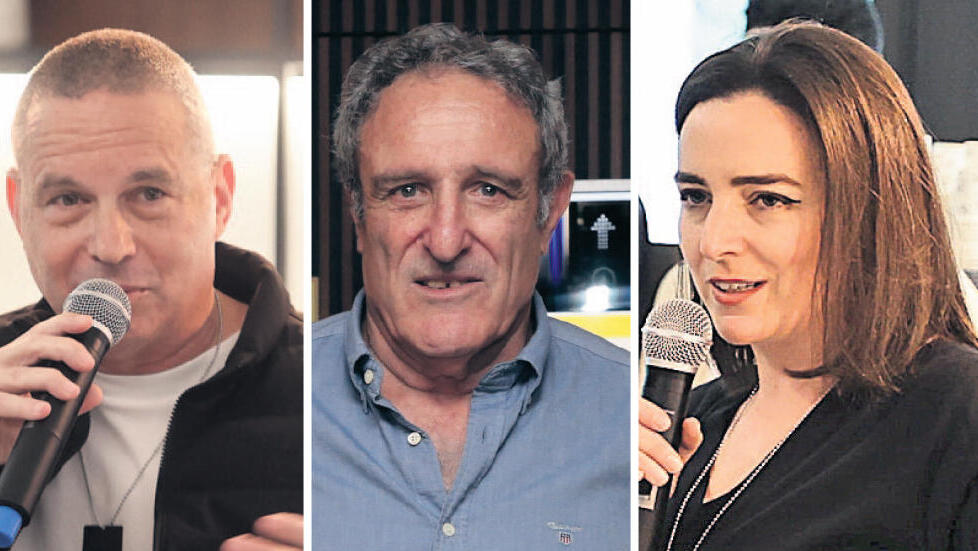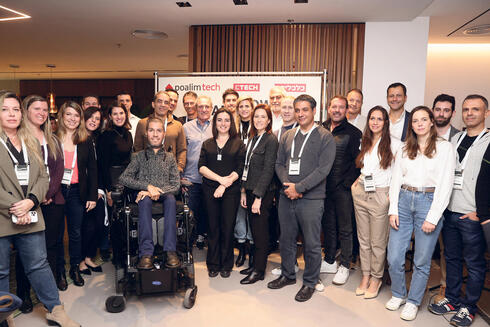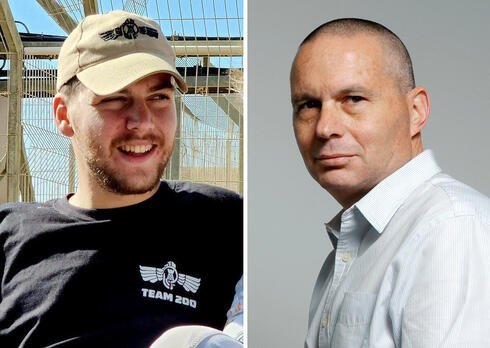
Roadshow+
“There is no State of Israel without high-tech”
Poalim Tech’s CEO Michal Kissos Hertzog was speaking at Calcalist and Poalim Tech’s Roadshow+, an event in which startups presented their ideas to the leading venture capital funds in Israel
"The role of entrepreneurs is to always be optimistic because this is what drives the economy and high-tech", is how Calcalist’s Sophie Shulman opened the 2023 Roadshow+ event of Calcalist and Poalim Tech that took place at the Tel Aviv Expo. Over 200 companies submitted applications to participate in the event that brings together entrepreneurs and investors. Of those who applied, 17 companies were carefully selected to participate and each met with representatives of VC funds at the event.
In the last year, and in the last two months in particular since the start of the war, startups have had difficulty raising capital and the meetup was designed to give the startups an opportunity to present their ideas to the leading venture capital funds in Israel.
VCs that participated in the event included: Michal Kissos Hertzog, Poalim Tech; Emanuel Timor, Vertex; Yuval Cohen, StageOne; Hadar Siterman Norris, Team8; Lotan Levkowitz, Grove Ventures; Ben Tytonovich, Maple Capital; Omry Ben David, Viola; Hamutal Meridor, Vintage; Erez Shachar, Qumra; Adi Gozes, Entrée Capital; Yair Snir, Dell Technologies Capital; Keren Kopilov, Firstime; Tal Yatsiv, PICO Ventures; Idit Muallem, Pitango; Guy Yamen, TPY; Kobi Samboursky, Glilot Capital; Sapir Harosh, Third Point Ventures; Yaniv Golan, Lool Ventures; Gadi Porat, JVP; Yodfat Harel Buchris, Blumberg Capital; Adi Dangot Zukovsky, 10D; Shahar Botzer., Good Company.
"I feel the need to apologize that we are sticking to the necessary routine around the difficult events we are currently going through," said Bank Hapoalim Chairman Reuven Krupik. "The State of Israel is experiencing a very difficult crisis that includes two aspects: military-security and economic. In the State of Israel, the economic foundations must be strengthened because without them there will be no security. The leadership will have to adhere to an economic rationale despite a political rationale and this is called prioritization. When expenses go up, if you don't prioritize the flow of funds to the right places, then you damage the economic foundations."
Krupik also related to high-tech as a former entrepreneur: "High-tech makes up about 20% of the country's economy, and all these years I made sure to say that the second and third waves of high-tech's influence should also be included in the calculation. Today there are models that know how to measure the effect of the waves of high-tech, and there are already studies that show that in many places high-tech will double its influence, it will affect the economic impact and that's why it has a super important role. In Israel's economy, you have to maintain some kind of growth, and high-tech has an important role in that."
"In conclusion," Krupik said, "our whole story is built on creativity and innovation, and creativity can not be ordered by demand. I am truly sure that Israeli high-tech will maintain its status and continue to flourish because creativity is part of our national story, it is our asset, and that is why in the future we will have a powerful high-tech the way we had before."
"On the one hand, it's surreal to be here, but on the other hand, we have to because we have no other option," said Michal Kissos Hertzog, CEO of Poalim Tech. "When I talk to friends in the IDF reserves, they say they don't want to return to a divded nation and a deep economic crisis. We will not run away from a crisis and we have a responsibility to make sure that we can get out of it quickly. There is no State of Israel without high-tech! And so we must continue and our future lies in those who are here today. We are all here so that this thing will succeed - entrepreneurs, investors and us as a bank."
Related articles:
The entrepreneur and venture capitalist, former Minister of Science & Innovation Izhar Shay, who lost his son Yaron, a soldier in the Nahal Brigade, in the Hamas attack on October 7, came to speak about the importance of startups after the terrible attacks and their importance to ensuring our existence here. Shay meets investors around the world and connects them to Israeli startups and in the last few weeks founded new ventures that were born out of his situation and personal grief.
"'These are extremely difficult times,' is a phrase I have heard dozens of times over the years that I have been a part of the State of Israel and Israeli high-tech," Shay said. "In 1991 there was the Gulf War and we were threatened with chemical weapons from Iraq. After that we had the second intifada and the second Lebanon war and the crisis of 2008 which severely affected Israeli high-tech and of course the Coronavirus. The common denominator of these crises is the penetrating insight that in the end everything will be okay. When they asked me at first how I was, I answered that it would be fine. This is a deep and correct answer, certainly when talking about our Israeli society that cannot think otherwise."
As a high-tech entrepreneur who founded companies and raised funds, he knows how to say with certainty that "if you don't get up in the morning with the feeling that everything will be fine, it is very difficult to answer to the title of entrepreneur. In my lectures, I show that the life of an entrepreneur is full of ups and downs. There are more downs and occasionally ups that make everything worthwhile. Now we are at war, people are mobilized, there is a difficult national mood and we are all worried. This is the reality and we have to work with it."
Shay told about the time he ran a company in New York after September 11, which was a difficult and challenging time. The whole world changed and uncertainty and insecurity prevailed. "The world was trying to understand where we were and there was no point in picking up the phone to investors. The difference between companies that survived and those that didn't was whether you had money in your wallet or not.
"At the time, one of the executives at one of the banks in New York told me 'this is a time to tell the men from the boys’. That was over 20 years ago. I think that is a true sentence in the sense that if we are entrepreneurs or VC funds who finance companies or people who are in the ecosystem, then we understand that obstacles are part of our way of life and we need to intellectually figure out how to deal with an obstacle. The army will do what is necessary, but surely in the tech world we are moving forward to continue building companies and figuring out how to appeal to the tough investors."
Shay spoke about the role of high-tech in today's environment: "In all the crises I described, the fastest and most significant recovery and what most contributed growth to the Israeli economy came from the people sitting here in the room and their ilk. For that we are all proud and that is also our responsibility. If there is an industry that is able to take the State of Israel and somehow finance the billion plus shekels a day that the war costs us and to deal with the deficit and the decrease in consumption and production, this is the industry. We are looking for meaning and not only to produce the best product and service in the world. It’s our responsibility, both now and for many years going forward.
"We are in a state of war that will eventually end and we will move to a normal economy after the war, and in my understanding it is an excellent time to establish companies, nothing worse than what happened already will happen. The global investors who look at us are beginning to understand this and this cycle will begin, it may have already started. Two weeks ago, the incoming CEO of Hamilton Lane, Juan Delgado, was here on a solidarity visit. It is one of the world's leading companies in investment management whose role, among other things, is to recommend to investors in the world where to put their money. I asked him when it was time to invest in Israel and he told me that he had given orders to his people in the United States to talk to investors and tell them that now is the time to invest in Israel. He explained to me the rationale behind it. There is a crisis here and he trusts us to take care of our own affairs. This is an economy that is based on innovation, and if he believes in it and gives instructions to his people to go invest, then who are we to contradict this thesis."
Shay spoke about two initiatives in which he is involved. The first is "Hazvei October", an initiative with an optimistic spirit. "At Yaron's funeral, we felt that beyond our personal disaster, a national disaster occurred that could have been avoided if we had learned the lessons from the Yom Kippur War. As an entrepreneur, I said that global and Israeli high-tech could have methods to collect pieces of information from such a process and extract insights. This is how the world of big data works, the algorithms begin to point out trends from the information. There is an infinite pool of information that includes all the things that happened in the State of Israel. You can put it in a database and get insights.
"We started with ideation, we talked to consumers of the information, we received positive feedback from researchers at the university and members of the security establishment who were happy to see our system working because they want an external system that will perform analyses. We are in collaboration with the best experts from Google and Microsoft, and with Dr. Kira Radinsky and more. There are dozens of ad hoc projects that provide immediate answers to Israel at the level of technological products. For example, one of the most difficult problems the country has had to deal with is the identification of the victims. So Israeli high-tech mobilized to create a system that instead of identifying body parts, it would be possible to identify an image (photo).
The second project is "Next October" which was born during the swearing-in ceremony for his son Yaron, who was killed in an heroic battle in the southern Gaza Strip. Yaron and his friends helped protect Kerem Shalom and prevented the type of disaster that was suffered by Be’eri and Nahal Oz.
"In the Jewish tradition, a tree or a forest is planted in honor of a person or a community who has passed away, so instead we thought of developing startup companies that would bear the names of all those who lost their lives on October 7. This is how the initiative was born. The logo is the phoenix, which always rises and is resurrected.
"From an economic point of view, 1,400 startups will be established that will create job opportunities. Secondly, the project ensures that the nature of the murdered or fallen victim matches the nature of the startup. Thirdly, this is a message to the world. There are not many positive messages coming out of the State of Israel that are of interest to the world, but the world is interested in Israeli innovation and this is our answer - they came to destroy us and murdered 1,400 people, so we produce solutions and products that will make this place and the world better. In addition to producing a good product for a better world, they will be part of a national effort to remind ourselves that October 7 will never happen again and whoever paid the ultimate price deserves to be remembered."


